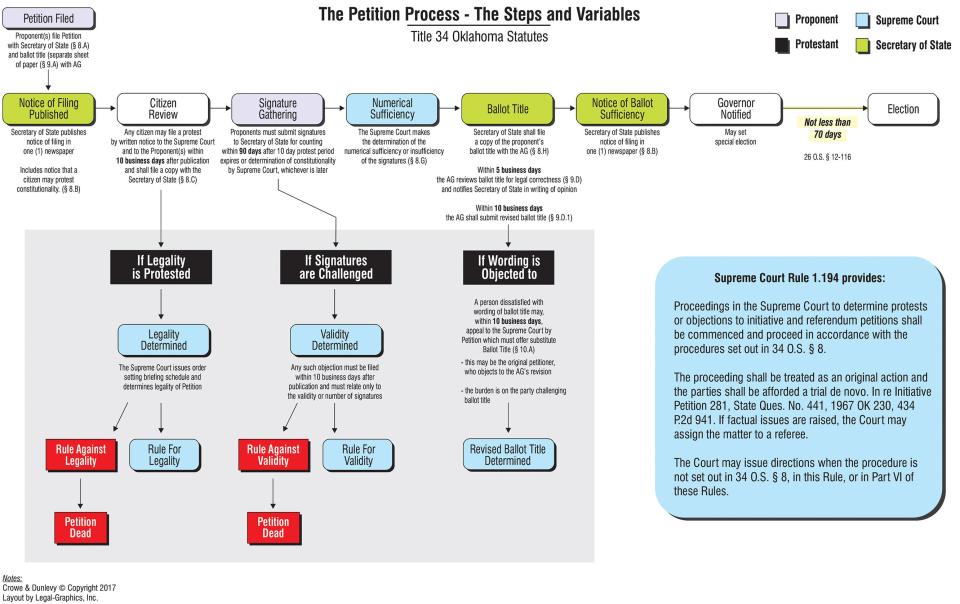Will the Oklahoma Legislature make it harder for residents to propose their own laws?

The Oklahoma State House of Representatives soon could consider a bill already passed by the Senate to make it more difficult for residents to propose their own laws. With Senate approval and signature by the governor, proposals like the recent recreational marijuana initiative would be more difficult to get on the ballot.
The initiative petition process has been used successfully to legalize medical marijuana, expand Medicaid coverage and reform criminal justice. It was also a residents' initiative that created the current Oklahoma Ethics Commission, which established what is "ethical conduct of campaigns and of the public actions of state officials."
The bill under consideration is Senate Bill 518, and it is co-authored by state Sen. Julie Daniels, R-Bartlesville, and state Rep. Mark Lepak, R-Claremore.

How would SB 518 change the petition process?
1. Anyone who files a petition would be charged a minimum fee of $750 for publication costs.
Each petition must be published "in at least one newspaper of general circulation in the state" by the secretary of state. As it currently stands, the secretary of state pays to publish a petition notification, but that would change under SB 518. A minimum fee of $750 would be charged to take the publication costs off of the secretary of state and place the burden on the resident who files the petition.
2. It would implement a stricter verification process by mandating an additional "data point."
After sufficient signatures are gathered, proponents of the petition are required to submit them to the secretary of state to be checked for validity. The resident's signature and personal information must correlate with the data points listed on the Oklahoma voter portal, which include the voter’s legal first name, legal last name, ZIP code, address, and numerical month and day of birth.
If, for example, a person signing the petition changed addresses and writes an address and ZIP code that do not match the Oklahoma voter portal, it would result in two incorrect data points. Currently, three data points must match the Oklahoma voter portal to qualify, but this bill would change the requirement to four data points.
3. It would change the protest period from 10 to 20 days.
Signature gathering cannot begin until the protest period is over. Any resident may file a protest to the Oklahoma Supreme Court to verify legality of proposed legislation. If this bill passed, there would be double the amount of time to argue the legality of the petition.

Why is a change in the law needed?
"We are asking Oklahomans to vote on very important issues, and I, as a voter, want to have confidence that when an issue becomes a state question that everything has been done correctly to get it there," Daniels said.
Before proposing the bill, Daniels said the secretary of state's office suggested the extra data point and filing fee.
"A few individuals filed multiple (petitions) and never pursued them beyond the initial filing," said Jeffrey Cartmell, counsel to the secretary of state. "It's really a way to recoup some of the costs that our agency incurs by having to publish anything that's filed whether it gets followed up or not. ... (The extra data point) will provide a greater level of integrity to the overall process."
A registered voter who signs the petition appropriately is not going to get their signature disqualified, Daniels said.
Officials say:SQ 820 vote was mandate for tougher regulation of medical marijuana in Oklahoma
Some say getting an initiative on the ballot is already tough enough
Ryan Kiesel, senior consultant of the State Question 820 campaign, said the process as it stands is "extraordinarily difficult."
"I 100% agree with the author of this legislation that signatures placed on a petition should be validated," Kiesel said. "If the state of Oklahoma is going to increase the bar, which is very high already, to place a measure on a statewide ballot, I feel like the state should have a compelling reason for doing so.
"I haven't seen anything to suggest that there's not integrity in the process. This is really just about the principle that this is an essential right, that our constitution in Oklahoma gives to us, and we should be very skeptical of any effort to make it harder than it already is."
Is passage of the law really an 'emergency?'
Daniels said she decided to put an emergency clause on the bill to "be in good shape for petitions in the future."
Cindy Alexander, Oklahoma Direct Democracy Team co-leader, does not believes SB 518 constitutes an emergency, as defined in the Oklahoma Constitution.
"In section V-58 of the Oklahoma Constitution, the definition of an emergency there is immediately necessary for the preservation of the public peace, health or safety," Alexander said. "It's hard to fathom that changing how many data points are checked on a petition signature has anything to do with the preservation of public peace, health or safety."
More:Oklahoma House Republicans vote to expand a person's right to self-defense with a firearm
What's next?
The bill will advance to the House of Representatives. If it passes, the governor will have the opportunity sign it into effect.
To keep up with the bill's progress, refer to the Oklahoma Legislature website.
This article originally appeared on Oklahoman: Oklahoma Legislature considers reforms to initiative petition process

